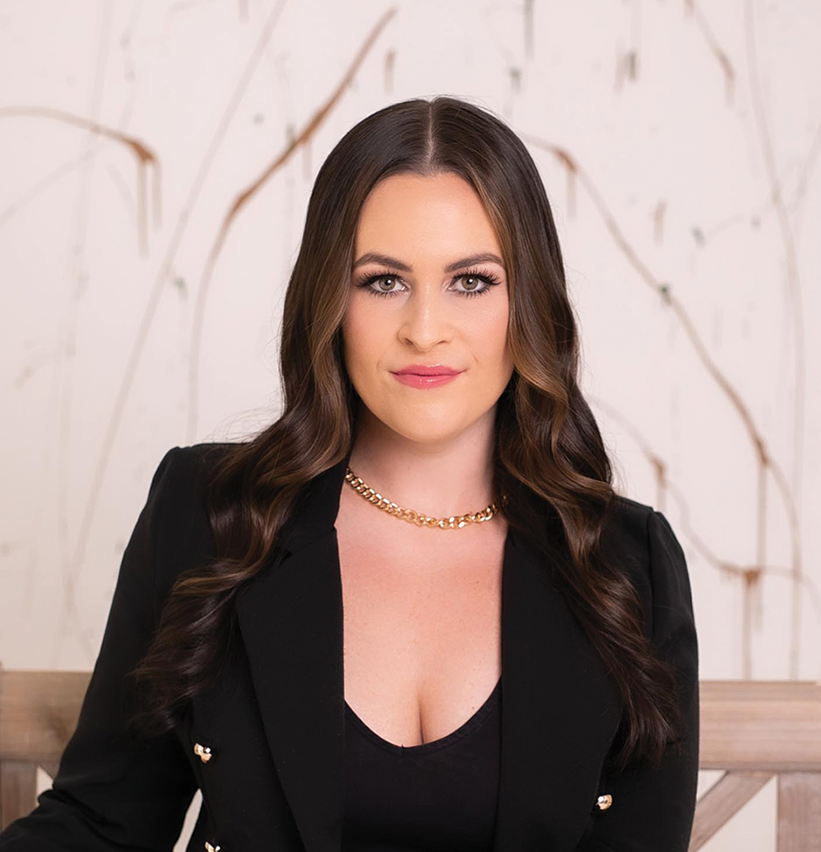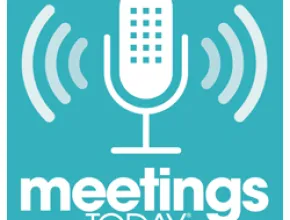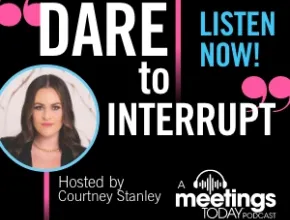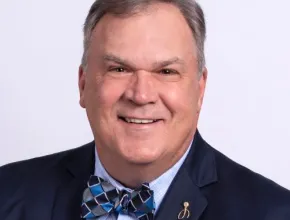Courage, Commitment and Character: Choosing a Warrior Mentality and the Will to Win
It is not the obstacles we face that define us, it is the way in which we approach life’s challenges that shapes our legacy.
In this episode of Dare to Interrupt, Anne Hamilton, Vice President of Global Travel and Expense Management at The Walt Disney Company, shares her incredible story and explains how determination, courage and paying it forward creates the foundation for success, impact and legacy. Listen now.
Want to hear more from Courtney and her incredible guests? Find all Dare to Interrupt episodes here.
Rather read the conversation? See the transcript below:
[Start transcript]
Courtney Stanley: Hi everybody. This is Courtney Stanley, and welcome to another exciting episode of Dare to Interrupt, a listening experience where you have the opportunity to be a fly on the wall and sit in on honest, unfiltered conversations with women who are considered to be the most influential and inspiring leaders in the world of events, hospitality, tourism and beyond.
Throughout their careers, these women have dared to interrupt conversations their own comfort zones and societal norms to hustle toward the greatest levels of success. I’m so excited to introduce you to today’s guest. She is one of the most highly respected women in our industry, and someone that I truly consider to be one of the greatest leaders of our time.
So, without further ado, allow me to introduce you to Anne Hamilton, vice president of global travel and expense management for none other than the Walt Disney Company. Hi, and thank you so much for being our featured guest today.
Anne Hamilton: Thank you, Courtney. I’m very excited.
Courtney: Good. Well, it is an honor and a privilege to have you on this episode. You are somebody that I truly look up to from afar and also from the stage. I know we had an opportunity to speak together last year at MPI WEC, and I was just so inspired by your story. And you truly have paved the way for a lot of other people to follow in some pretty big footsteps.
Anne: Thank you, Courtney. I’m very humbled by what you had to say. And it’s been a journey. I hope I can make a difference in other women’s lives—actually anyone’s life. The hospitality industry can be really tough on individuals. I think when I was coming up, it was extremely different at that time, and there was a lot of expectations that going into the industry, in order for you to move up, the type of accomplishment you had to have, and you had to have the ability to move around and be relocated. And that can be very stressful, especially as someone who was a single mom during that time, and a woman. The odds were not exactly in my favor. But I ended up really seeking out some tremendous leaders that made a difference in my life.
Courtney: That’s amazing. What do you feel are some of the biggest differences between then and now?
Anne: I think now, the overall industry understands that the demands they make on individuals’ lives; there has to be personal, professional, and then I will say, education, and that continued investment in the individual, so they can move up. But that quality of life and work-life balance is much more prevalent and much more—let’s say a point of discussion—than it was. It just never was even discussed. You would work 12-hour days, and that’s just the way it was when I was coming up in the industry right out of college.
Now, companies are looking at, they want to invest in their employees, they want them to be happy, they want them to come to work and be satisfied. But they also understand there has to be a work-life balance in order for that employee to give their very, very best to their customers. I see that as a significant change in our industry.
Then the second piece is the education—there was no education or investment in someone’s career. And now, it is and there’s organizations like MPI that are extremely well positioned to provide that type of education. And I believe through their membership that they see whether it’s—let’s say the hotels, airlines, the different industries today, or it’s even smaller companies—that they are ensuring that their employees are getting that continuous education, so they can continue to build and make themselves relevant in today’s environment.
The world is moving extremely fast. The travel industry at large is changing and going to be significantly different five years from now. And those that are going to keep up are going to stay in, and those that aren’t will fall behind. And it’s a highly dynamic industry right now.
Courtney: Yeah, I think that’s absolutely right. And I think that it’s really interesting to look back on how the industry was and how it’s evolved and how it’s gotten to the place that it is today. And to have somebody like you who hustled hard. You mentioned in the beginning of the episode that you are a single mom. What was that like having to balance, furthering your professional development and education, and climbing the ladder to be in the place that you are right now and to raise a child? How was that balance—how did you play that out?
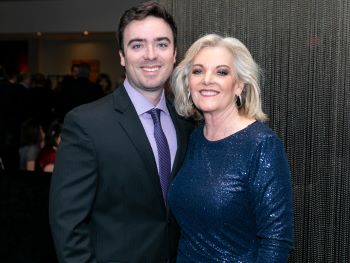 Anne: It was difficult. When I speak to women who ask me that question, I say, “You know what, there are very tough decisions you have to make on time and place.” (Photo: Anne Hamilton with son Ian Hamilton)
Anne: It was difficult. When I speak to women who ask me that question, I say, “You know what, there are very tough decisions you have to make on time and place.” (Photo: Anne Hamilton with son Ian Hamilton)
And I worked really hard to try to be at the most significant moments in my son’s life, that he would remember that his mom was there. I may not have made every soccer game or every golf tournament, but I absolutely made the most I could, and let’s say the ones that really counted.
It goes back to the leaders. There were some leaders, quite frankly, that I chose not to work for because that wasn’t—again, I’m going back a long time—but still, being a woman and being a single parent, I was not a person they actually wanted to hire, because they did not think they could get the most out of me and I could meet the job expectations.
So, I didn’t have to set myself up, so I had the daycare and individuals that could watch my son so that I could continue my career and further my career. But I also sought out to work for leaders who would be empathetic but also invest in me and see that if you help me continue to be the best mom I can be—which is important to me—I will give you 150% back in my job.
I was fortunate enough, and I sought out those types of leaders. And I believe I am where I am today because those leaders that I had were tremendous. And they’re tremendously successful in their own right. But they had that vision, and they saw the skills and my wanting to learn.
I went back at the age of 50 and got my MBA, because at that time the industry was going into a recession. And I just looked, and I said, I have to learn to think different. I want to keep myself relevant, and I want to perform my role and I want to excel in it.
So, that was unusual for, again, someone to go back and get their MBA at 50, the oldest person in the class, but it was a game changer again at that stage in my life. Making the financial investment to get my MBA and be supported by my company, those are, again, the type of decisions that one has to make to continue to move forward. It just doesn’t come handed to you. You really have to plan, think about where you want to go, what you want to do, and what are you willing to give up to get there and to get in return. Because it does go both ways.
Courtney: Yeah. Yeah, that definitely makes a lot of sense. I think there are a lot of women who struggle with the question whether they have children, or they don’t, and they’re thinking about having children, they struggle with the question of, ‘Can I can I have it all? Can I do it all?’ And I think it’s really wise that you talk about looking for those leaders who will truly and honestly invest in you and believe in you—that you can actually do the work and that you’re there to show up. You have a life outside of work that you’re working to balance but you are going to do the best that you can.
For the women who are in situations like this where maybe they have just had a child or they’re thinking about it, or they’re struggling with that balance, how would you encourage women to have that conversation with potential leaders? What are the questions they should ask? And how can they convey that they’re there to give 150% if they’re chosen to be that person the company invests in?
Anne: I chose to be completely transparent and honest. I think because I had already worked and had a good reputation. In my career, when I when I first started, I was in the food and beverage side of the business, which was very hard. Probably longer than 12- and 14-hour days, and opened several hotels. [I] started to create that reputation.
And then at the point where I’m going to have a child and talking about how does this change your view of me? And how can I convince you that I don’t want to change my career path and I want to succeed; however, I don’t want to be relocated two and three times. Just kind of talk through—I can accept relocation, let’s say over the next seven years twice, and after that, I want to find a home base.
I was very transparent up front and because I believe that I was a good successful leader that I, again, found the right people that believed in me and said, ‘Okay. I’m going to work with you.’ And I appreciate that they appreciated the honesty, and then they knew exactly what my commitment was.
And commitment and courage—two very important words that I believe those traits that every person, man or woman—you should have it wherever you work and not just in our industry. One, you have to have the courage to believe in yourself and to believe in what you’re doing, and where do you want to go and be able to articulate that.
That, to me is just a very important trait. And commitment—if you make a commitment, you honor that commitment and you see it through. Companies appreciate that and they appreciate people that have commitment and courage.
Courtney: I love that you use the word courage, and that’s actually something I remember from the last time that we saw each other, when we did have an opportunity to have a conversation on the stage together. And I really appreciate the use of that word because I don’t feel like people think about it enough. I think that sometimes people think about the black and white of getting the job or having a family or getting a promotion or making a certain amount of money.
And there’s a lot of courage that is involved in having that opportunity to grow and to excel in your day-to-day life and over the years. But I think people kind of forget that it does take a lot of boldness, and it takes a lot of commitment. And it takes that courage to be able to push yourself to go out and get your MBA and be the oldest person in the class.
So, I’m curious, Anne, because you’ve done so many incredible things, and it sounds like you really have approached life with that courage that you speak of. But were there any times or have there been any times in your life where you feel like you have had to work a little bit harder at finding that courage that you believe is so important to living your life?
Anne: I do. And I’m going to try not to be emotional about this, but I am a cancer survivor now twice. I’m happy to say that I got a clean PET scan and that my cancer—I am in remission and it is gone for the second time.
And when the cancer came back three years ago, I was giving up and I went to my leader and I just said, “I don’t think I can do this all again. I just don’t think I can.” And he was just so incredibly wonderful and caring and supportive and said, “You know what? You make the decision. If you want to fight this, we’re going to fight it with you. I’m going to be there and continue to support you.”
It was a new role for me at Disney and I love it. And when I went in last week, and I said to him, “Okay. I beat it. I beat it again, as luck would have it.” And I said, “You had a lot to do with it because you kept inspiring me and supporting me, good days and bad days. And that makes such a difference.” And I had a lot of people—a lot of people—supporting me, praying for me and just kind of giving me those calls of support.
But you know, that was a moment, a moment to say, can I do this again? How many things in my life am I always battling? Is there ever not going to be a battle So, but now I’m excited. I’m thrilled. I feel like I’m rejuvenated again, ready to take on more things. And so, that just makes it just that much more exciting when you actually don’t think you can do something. You turn around and people around you will say, “Yes you can.” And then you can.
So, that’s my recent example. There’s a lot of people out there that have an illness, and they may think that’s going to change let’s say themselves, their perception, their support, what can they do? But it’s that drive.
To your point, the courage and the drive to say, ‘I can beat this I can accomplish this. I see a light at the end of the tunnel. I see the top of the hill,’ and just motivating yourself every day. And that’s how if you live your life that way, I think when you can see good, the good and bad don’t matter anymore. It's just every day is a great day, and every day I can make a difference. And that’s just how I live my life.
Courtney: Well, that is amazing. And I am so happy to hear that. That’s incredible news. I wish you could see my face right now because I’m just, I’m smiling and I’m so... I’m just happy. I’m happy for you. I’m happy that such an amazing woman was able to fight and go to battle—not once but twice—and win.
So, I’m so happy to hear that, and congratulations on actually doing that and being somebody that can share this story that I know other people can relate to. And other people will be inspired to hear that you not only decided to fight with courage, but you also had the courage to be vulnerable with people around you with the people who are supporting you, but also with the people that you’re working with.
I think that’s a really important piece of the story, is that the people that you’re working with know you so well and they believe in you and they have so much faith in you that they will go to the ends of the Earth to make sure that you feel like you can win. And they’re there to help you do that. And I think that that’s absolutely amazing. What an incredible story, Anne.
Anne: Thank you, Courtney. If I can add to something you said, it is about the people you work with. And it’s about the company you work with. And I do think there are a lot of women out there that if you’re happy at what you’re doing, and you’re treated right, and you’re motivated, you’re self-motivated and you feel you’re accomplishing what you want to achieve, that is success.
So, it doesn’t mean you have to be a president of a company, or you can be a manager and accomplish all the same things. It’s the feeling you have inside of pride, respect and being able to accomplish the goals that you set forth for you. And everyone is different. But it is that feeling that you have—again, that respect for yourself—and that feeling that you are successful for what you want to accomplish.
Courtney: I think that’s a really great point. And I think sometimes we do get caught up in defining what success actually means. And I think that we look to our left and we look to our right, and it’s so easy to compare ourselves to the success that other people have had. And it really is that feeling. It’s the people that you’re surrounded by, it’s the way you’re that you’re living your life, and it’s your perspective. And I think that that’s true. That truly is what defines success on a personal and really on a unique level from individual to individual.
I’d love to ask you a personal question. I’m really curious how being diagnosed with cancer and beating it the first time and then having it happen all over again, how that changed you? How that changed your perspective, or the way that you live your life, or see the world or treat other people. I’m curious, what changed?
Anne: When I was told my cancer had come back, I had already talked myself into, ‘I’m just going to let it go.’ I mean, this is a hereditary type of cancer and I just lost my brother, who’s a year younger than me. And I just said, it’s inevitable. So, why just prolong and go through the whole—I guess everything from the medication to the side effects to the drug effects that there’s so much involved in anyone that has cancer, there’s much more to the story than ‘I’m being treated.’ There’s a lot of emotion and physicality challenges that you’re not the same person when you’re going through the process.
And here were so many people around me that said, ‘You beat it once, you can beat it again. This is nothing. You’ve been through this before. You’re gonna even be better at it.’ And again, Disney was incredible. They helped me get some really great doctors, and I was commuting to New York and getting my treatments, and it’s an experimental drug, an immunology drug.
So, okay. I looked at it to say, “Okay, my family has a history. If I can make a difference for them...” And then I looked at it and said I can make a difference for all other people. And if it doesn’t work, I tried. If it if it works, and I’m successful, that means that’s another way I can change people’s lives. So, you know what? I can’t sit back and kind of feel sorry for myself. I have an opportunity here to pay forward this so that this time around was not even close to the experience I had first time. It was so much better.
And that brings me incredible joy that the whole medical industry is moving forward with these new drugs that are easier on your body, easier to continue to be able to do just normal things like even keep a job and work. And that gave me the energy that I’m sure you hear my voice and the excitement to say, I’m making a difference. I’m going to help people’s lives, not just my family, but I’m going to help anyone that has my type of cancer, and that brings me joy.
Courtney: That’s incredible. That’s absolutely incredible. And hearing how you are so intentional about keeping that mindset and paying it forward and helping and supporting other people who are going through similar situations, truly brings one word to mind. And for me that word is legacy.
And I think, from my perspective, it sounds like you’re leaving such an incredible legacy every day to the people that you work with, that love you and to people that don’t know you yet, but will or might, because they run into the same life challenges, or they cross paths with you, and they feel so touched by your spirit and your energy. And I just think that that’s absolutely amazing. And I think that it’s so important for people to take a step back and to zoom out from the day today, and to really ask the question, what kind of impact am I making on the people around me? And what kind of legacy do I want to leave?
So, if you could give people any sort of advice in terms of leaving a legacy that really matters, or doing something that’s important to them, but also impacts other people, how would you encourage people to do something like that?
Anne: When someone asked me, “What do you want your legacy to be?” And I said, “I just want people to say, ‘she gave it her all, she had a great time, but she touched so many lives, and she made other people’s lives better.’” That would be great because I just want to pay forward what I I’ve had from my family and my support group and my company, to which I want to make people live better. And that’s it. It’s simple. And it sounds trite, but it’s not what people do every day.
I mean, I will say, in our technological world that we all live in, you can become very solo and isolated in a very small group of community. But there are things that we can do that can make a difference in many lives, and maybe people we’ll never meet, such as the cancer experiment program that I’m in. But there’s also the mentoring.
I’ve shared with you before, Courtney; mentoring helped me so much in my career. I do mentor and spend the time that if someone reaches out to me, I really try to help them and guide them and give them direction that they may not have been given or have or another outlook on the way to look for a job or their career or balance in what they want to achieve.
So, we all can do that. If we all just have one or two people a year that we help that way, can you imagine the difference in this industry that we could make in I would say, the young people coming up that might need that guidance and support?
Courtney: I think that’s great advice. I really do. I know that I have had and have some really incredible mentors who have helped me in a lot of different ways over the years when different challenges popped up that I was faced with and I needed advice, or in the reverse, any sort of help that I was able to give the mentors that gave so much to me is also so important.
I think there is such an opportunity to make a difference as a mentor and as a mentee, and for everybody to pay it forward in that way and really support and empower one another to learn and to grow. And to be honest, Anne, anyone that you have mentored, I am sure is so grateful to have had you as part of their life.
So, I think this is the perfect place to wrap things up. And I think that it’s just such an honor and a privilege for the listeners in the audience to hear a little bit about your story. And I truly think that they will walk away feeling inspired and motivated to maybe look at things a little bit differently, and to also pay it forward to the people in their lives. So, thank you so much, Anne, for being on Dare to Interrupt today. It’s been a true privilege.
Anne: Thank you, Courtney. And I appreciate having the opportunity. So, thank you.
Courtney: And thank you all for listening. Make sure that you never miss an episode like this one with Anne Hamilton by subscribing to Dare to Interrupt on Apple podcasts on Spotify, Stitcher, Google Play and all of the other major platforms. Thanks guys, and we will see you next time.
[End transcript]
About our guest:
Anne Hamilton
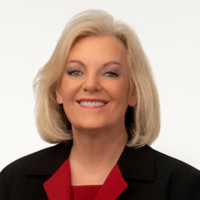 As Vice President of Global Travel & Expense Management for the Walt Disney Company, Anne provides essential operational strategic leadership for her teams who serve the needs of traveling cast members on a global basis for the Walt Disney Company and its subsidiaries.
As Vice President of Global Travel & Expense Management for the Walt Disney Company, Anne provides essential operational strategic leadership for her teams who serve the needs of traveling cast members on a global basis for the Walt Disney Company and its subsidiaries.
She oversees management of Disney’s T&E policy, travel services providers, SAP Concur services, travel and purchase card programs, expense auditing and the integration of T&E services.
Her teams execute the ongoing negotiations and implementation of commercial airlines, hotels and transportation vendor agreements. Her team drives the management of technology enabled travel solutions and the overall policy compliance, and related reporting.
Prior to leading the Global Travel & Expense Management team, Anne was Vice President of Resort Sales and Services for Walt Disney Parks and Resorts. She has been with Disney for 24 years and has served in various positions in the meetings industry. Anne has served six years on the Florida State University Foundation Board of Trustees.
In recognition of her industry contributions, Anne was named an ASAE Fellow, PCMA Supplier of the Year, awarded the Meeting Planner Industry Champion Award and Leadership Award, and was honored as Florida State University Dedman Hospitality School Alumnae of the Year, Alumni Association Circle of Gold Award Recipient, FSU Women of Distinction and recently inducted in the FSU Hall of Fame.
How to connect with Anne:
- LinkedIn: Anne Hamilton
About our host Courtney Stanley:
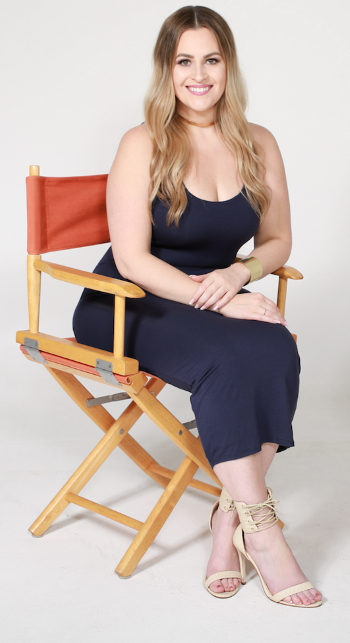 Courtney is a keynote speaker, writer, podcaster and career success coach with a background in experience design, community engagement and leadership development. Courtney is the host of Meetings Today’s “Dare to Interrupt,” a podcast that provides a platform for the event, hospitality and tourism industry’s most influential and successful women to share their stories of adversity and success, unfiltered.
Courtney is a keynote speaker, writer, podcaster and career success coach with a background in experience design, community engagement and leadership development. Courtney is the host of Meetings Today’s “Dare to Interrupt,” a podcast that provides a platform for the event, hospitality and tourism industry’s most influential and successful women to share their stories of adversity and success, unfiltered.
Courtney believes that transforming past experiences into impactful conversations through raw, authentic storytelling challenges the status quo, connects people from all walks of life and results in great change for the world.
- Courtney is the youngest member to have ever been elected to Meeting Professionals International’s (MPI) International Board of Directors
- She is the recipient of Smart Meetings’ Entrepreneur Award, MeetingsNet’s Changemaker Award, the Association for Women in Events (AWE) Disruptor Award, the MPI Chairman’s Award and MPI RISE Award.
- Named Collaborate and Connect Magazine’s 40 under 40 and a Meetings Today Trendsetter.
- Recognized as one of the event industry’s most impactful change-makers.
- Serves on the Events Industry Sexual Harassment Task Force, AWE’s Board of Directors, MPI’s Women’s Advisory Board, is a Meetings Mean Business Ambassador and is the co-founder of the award-winning movement, #MeetingsToo.
How to connect with Courtney:
- Instagram: @courtneyonstage
- Twitter: @courtneyonstage
- Facebook: courtneyonstage
- Website: www.courtney-stanley.com


